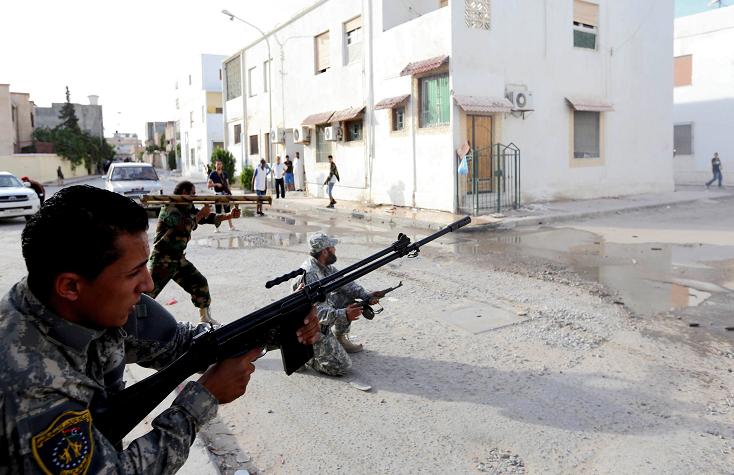Gunbattles erupt in Tripoli

Your support helps us to tell the story
From reproductive rights to climate change to Big Tech, The Independent is on the ground when the story is developing. Whether it's investigating the financials of Elon Musk's pro-Trump PAC or producing our latest documentary, 'The A Word', which shines a light on the American women fighting for reproductive rights, we know how important it is to parse out the facts from the messaging.
At such a critical moment in US history, we need reporters on the ground. Your donation allows us to keep sending journalists to speak to both sides of the story.
The Independent is trusted by Americans across the entire political spectrum. And unlike many other quality news outlets, we choose not to lock Americans out of our reporting and analysis with paywalls. We believe quality journalism should be available to everyone, paid for by those who can afford it.
Your support makes all the difference.Gunbattles shut down a neighborhood of central Tripoli on Sunday, as militias loyal to the government battled another militia that they said had gone rogue.
The clashes, which included the exchange of machine-gun fire and rocket-propelled grenades, underscored the shakiness of Libya's security even within the confines of the capital, where the country's security forces are headquartered.
A year after the fall of autocrat Moammar Gadhafi, rebels-turned-militias continue to dominate the country's quest for security. Libya's fledgling police force is mostly unarmed and lacks training and resources, local officials said. And the Libyan army is almost nonexistent; the chief of staff is a lame duck, according to Tripoli's top militia commanders.
Clashes broke out in Tripoli's Bab Bin Ghashir neighborhood Saturday night after residents said they confronted the Support Unit No. 8 militia for allegedly abducting and torturing two area residents.
"The problem is that the revolutionaries still think they're revolutionaries, not employees who march to orders," said Mohamed Abu Shkiwa, an official in the Tripoli Supreme Security Committee (SSC), a powerful union of militias that runs most of the capital's security operations and was leading the assault on the rogue militia. Shkiwa said the group had been under the SSC's umbrella until commanders revoked its "legitimacy" Sunday.
Bystanders watched Sunday afternoon as government-allied fighters and police personnel exchanged periodic machine-gun fire with the Support Unit No. 8 militia, which was holed up in one of the former regime's intelligence headquarters.
Plainclothes SSC fighters armed with Kalashnikov rifles and rocket-propelled grenades blocked side streets in the neighborhood and paced alongside trucks, radioing instructions.
Shkiwa said his forces knew of three people injured in the clashes. Residents said they thought the son of the rogue militia commander Mohamed Warfalli had been killed.
By late afternoon, SSC fighters had set fire to the militia's building and residents reported looting in the area, according to the Reuters news agency.
Meanwhile, the General National Congress, the country's only elected body, carried on with its first session of the week, debating plans to inaugurate a new cabinet, seemingly oblivious of the clashes about a mile away.
The absence of a centralized security force and a clear chain of command has left Tripoli and other Libyan cities at the mercy of their most powerful militias. Most of them claim loyalty to the government, but officials in Tripoli have said that they have little control over the militias.
The security vacuum also has hindered national efforts to investigate an attack on the U.S. diplomatic mission in Benghazi in September that left Ambassador Christopher Stevens and three other Americans dead.
In that eastern city, where residents say security conditions are markedly worse than in Tripoli, a car bomb exploded in front of a police station early Sunday, injuring three, according to Reuters. No group asserted responsibility for the attack.
Meanwhile, SSC commanders in Tripoli said their forces had not previously gone after rogue militias because they did not want to set former revolutionaries against their peers.
"We feel so sad if we kill any revolutionaries, because they are revolutionaries who were with us from the very beginning," said Saad Garsallah, a high-ranking SSC commander.
---
Ayman al-Kekly contributed to this report.
Join our commenting forum
Join thought-provoking conversations, follow other Independent readers and see their replies
Comments